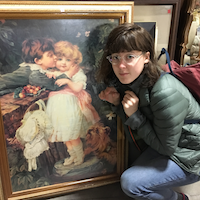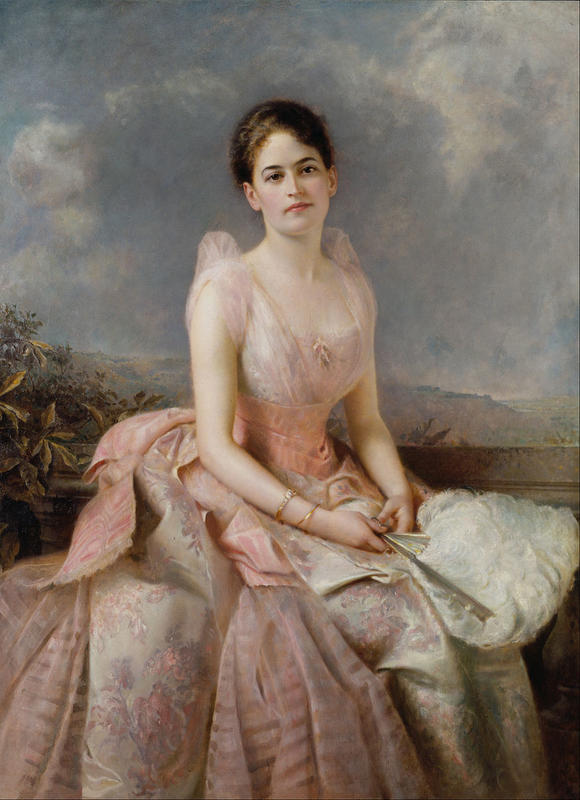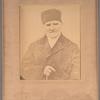More about Juliette Gordon Low

Contributor
Edward Hughes' portrait of Juliette Gordon Low was one of the first and last times she was pictured in full Southern debutante garb, pink frills and all.
The painting was commissioned by her husband as he liked to envision her from the most sought after portraitist of the day (whose other sitters included royalty). Later photographs feature her undeniably chic, crisp Girl Scouts uniform and hat. By that time she had decided to leave her “wifely duties” behind to join the long (very long) fight to secure rights and respect for women. At the very beginning of the women's movement in America, Juliette Gordon Low made waves finding her own way to empower young girls and to help emancipate them from their submissive role in society. But let’s back up a bit.
Juliette Gordon Low, or “Daisy” as she was affectionately called, was born in Savannah, Georgia to a cotton broker father and a writer mother (whose family played a role in the founding of Chicago). She was an accident-prone child--at one point breaking two of her fingers so severely that her parents worried that they were going to have to amputate them. As clumsy as she may have been, she made up for it in artistic passion and general curiosity. She was dubbed “Crazy Daisy” by her family and friends because she was both ambitious and eccentric: she performed theater and poetry and founded a newspaper with her cousins as well as a club called “The Helpful Hands Club,” through which they learned to sew and make clothes for children of Italian immigrants.
Gordon Low was so eccentric as a child, that it’s hard to believe that any person could dim her light. That’s why it really doesn’t make sense that she changed her personality for a man. The period when Daisy fell in love and married the wealthy William Low (called “Billow,” another amazing nickname) was the lowest of her entire life. Although the marriage began with true love, it quickly turned quite sour and loveless. Gordon Low stood by William up until the moment of his untimely death, but ultimately felt as if she had failed as a wife and a mother, having never produced any children. Widowed and without purpose in a period of her life during which she feared ending up “an idle woman of the world,” Daisy turned to friends, family, art, and adventure to rediscover her passion for life.
That passion came to her during a trip to London where she met Robert Baden-Powell, founder of The Boy Scouts. Gordon Low was completely taken by the group, which taught practical skills to boys, and felt that the same thing should exist for girls. For much of history, women were not taught self-reliance because it was believed that their place was inside the home. Our girl Daisy had another plan, though. Upon return home to America, she promptly established the very first Girl Scouts of America (then called Girl Guides) in her hometown of Savannah, Georgia. Her niece was the first girl enrolled.
The Girl Guides quickly became the new loves of her life; she gave them all the respect in the world, letting them decide their own fate at all times. Whenever there was a question about what to do next, Daisy always said “ask the girls,” and it was the girls who decided to change their name from “Girl Guides” to “Girl Scouts.” The name was officially changed in the United States in 1913. She worked tirelessly to expand the organization for many years, even using her own money to pay expenses and selling her own possessions when she ran low on funds.
Gordon Low and the Girl Scouts always advocated (and still advocate today) for a program atmosphere of inclusivity and accessibility. Low, herself was completely deaf in one ear and nearly deaf in the other, so she upheld a zero discrimination policy, admitting girls regardless of race, religion, economic status, or disability. Gordon Low did tend to exaggerate her deafness when she pretended not to hear friends who tried to shrug off commitments to work for the Girl Scouts, but that’s another story.
Juliette Gordon Low’s dedication and determination to create a better world for girls in America has been immortalized by various camps and scholarships established in her honor. She’s been featured on postage stamps, an opera, and was awarded the Presidential Medal of Freedom by President Obama for her contributions to the nation. I’m sensing a “Juliette Gordon Low National Holiday” next, who’s with me?
After a long and tumultuous life, Juliette died of breast cancer in her Savannah home at 66 years old. Per her request, she was buried in her Girl Scouts uniform with a telegram in her pocket from the National Board of Girl Scouts of the USA that read, “you are not only the first Girl Scout, you are the best Girl Scout of them all.”
Sources
- Gambino, Megan. “The Girl Scouts Celebrate 100 Years — Learning More About Juliette Gordon Low.” Smithsonian Magazine. https://www.smithsonianmag.com/smithsonian-institution/the-girl-scouts-…
- Roberts, Cokie. “Juliette Gordon Low: The Remarkable Founder of the Girl Scouts.” The Washington Post. https://www.washingtonpost.com/entertainment/books/juliette-gordon-low-…
- Denny Schultz, Gladys and Gordon Lawrence, Daisy. Lady from Savannah: The Life of Juliette Low (New York: Girl Scouts of the United States of America, 1988).
- “About Daisy.” Juliette Gordon Low Birthplace. http://www.juliettegordonlowbirthplace.org/en/learn/about-daisy.html (accessed 25 July 2018).
- “Juliette Gordon Low.” National Women’s Hall of Fame. https://www.womenofthehall.org/inductee/juliette-gordon-low/ (accessed 25 July 2018).
- Chatel, Amanda. “8 Facts About The Girl Scouts' History You Didn't Know, In Honor Of The Organization's 103rd Birthday.” Bustle. https://www.bustle.com/articles/68952-8-facts-about-the-girl-scouts-his…











